Business Report: Social Media, Regulations, and Emerging Economies
VerifiedAdded on 2023/01/05
|8
|1637
|29
Report
AI Summary
This report provides a comprehensive analysis of two key aspects impacting modern businesses: the rising risks of government regulations on social media firms and the influence of emerging economies on globalization. The first part delves into the challenges social media companies face due to governmental legislations, examining risks related to profitability, market share, and customer satisfaction, along with specific examples of regulatory impacts. The second part explores how emerging economies, such as India and Nigeria, present opportunities for business expansion, highlighting how globalization facilitates this process. The report uses examples to illustrate how businesses leverage resources and market availability in these economies. The report concludes by summarizing the interplay between social media regulations, globalization, and the strategic advantages businesses can gain from understanding these dynamics.
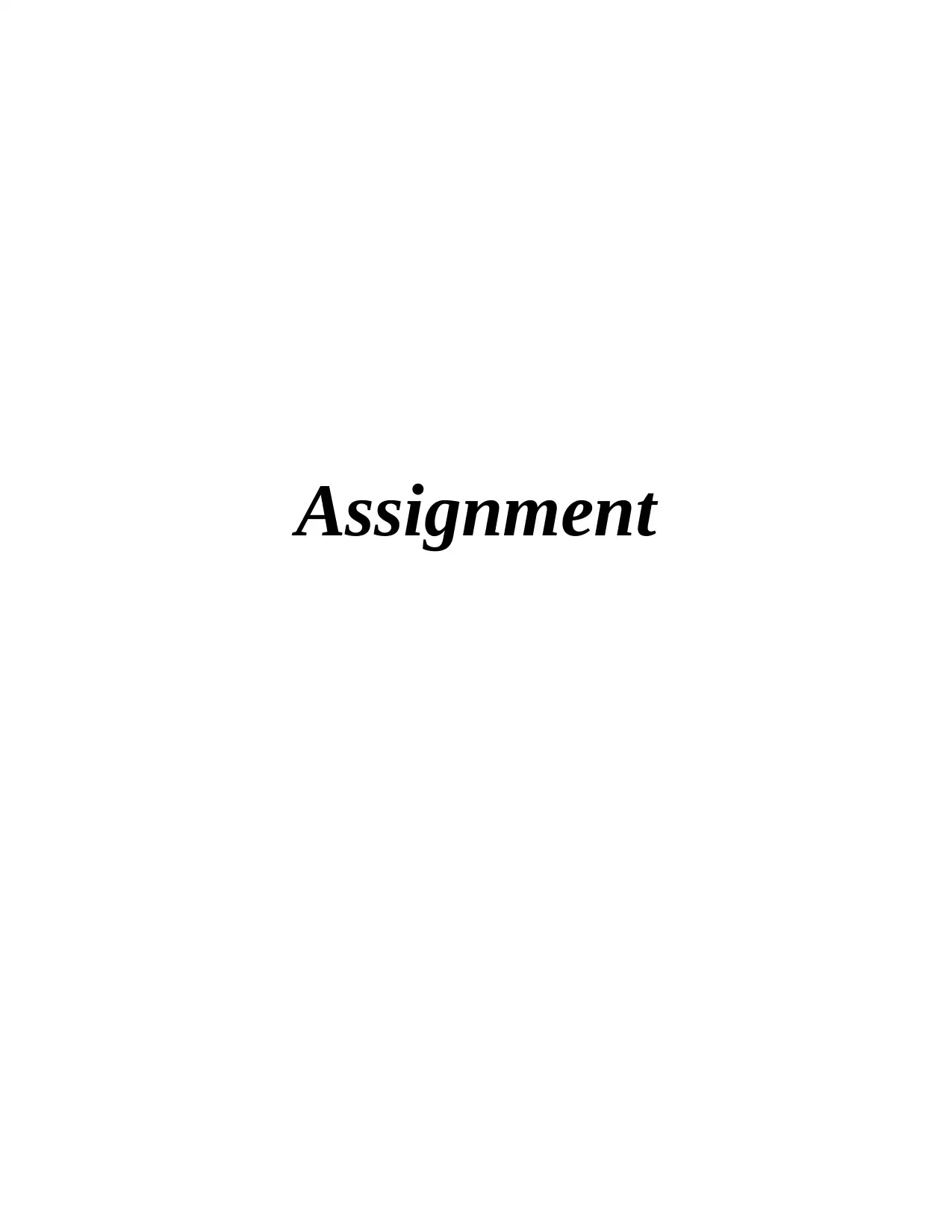
Assignment
Paraphrase This Document
Need a fresh take? Get an instant paraphrase of this document with our AI Paraphraser
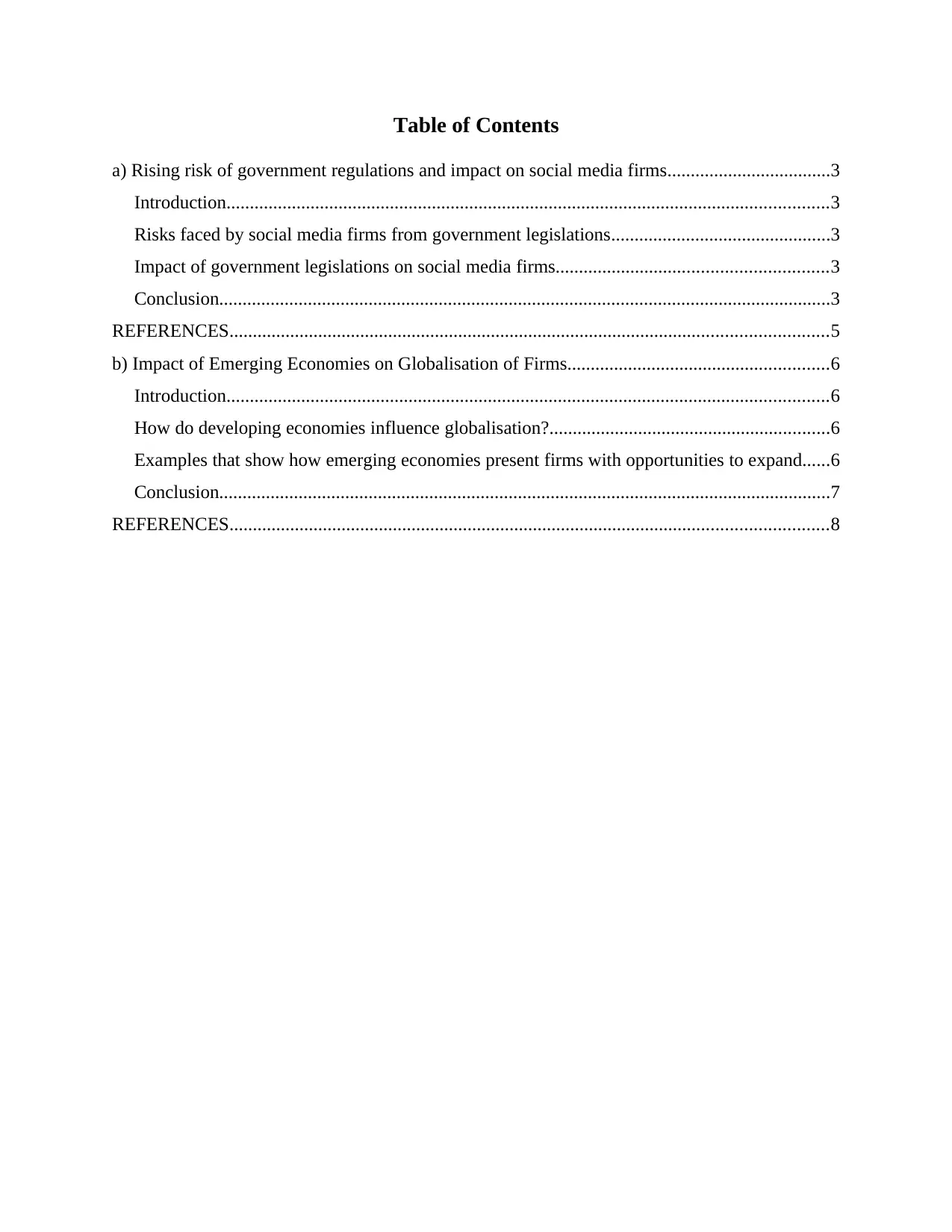
Table of Contents
a) Rising risk of government regulations and impact on social media firms...................................3
Introduction.................................................................................................................................3
Risks faced by social media firms from government legislations...............................................3
Impact of government legislations on social media firms..........................................................3
Conclusion...................................................................................................................................3
REFERENCES................................................................................................................................5
b) Impact of Emerging Economies on Globalisation of Firms........................................................6
Introduction.................................................................................................................................6
How do developing economies influence globalisation?............................................................6
Examples that show how emerging economies present firms with opportunities to expand......6
Conclusion...................................................................................................................................7
REFERENCES................................................................................................................................8
a) Rising risk of government regulations and impact on social media firms...................................3
Introduction.................................................................................................................................3
Risks faced by social media firms from government legislations...............................................3
Impact of government legislations on social media firms..........................................................3
Conclusion...................................................................................................................................3
REFERENCES................................................................................................................................5
b) Impact of Emerging Economies on Globalisation of Firms........................................................6
Introduction.................................................................................................................................6
How do developing economies influence globalisation?............................................................6
Examples that show how emerging economies present firms with opportunities to expand......6
Conclusion...................................................................................................................................7
REFERENCES................................................................................................................................8
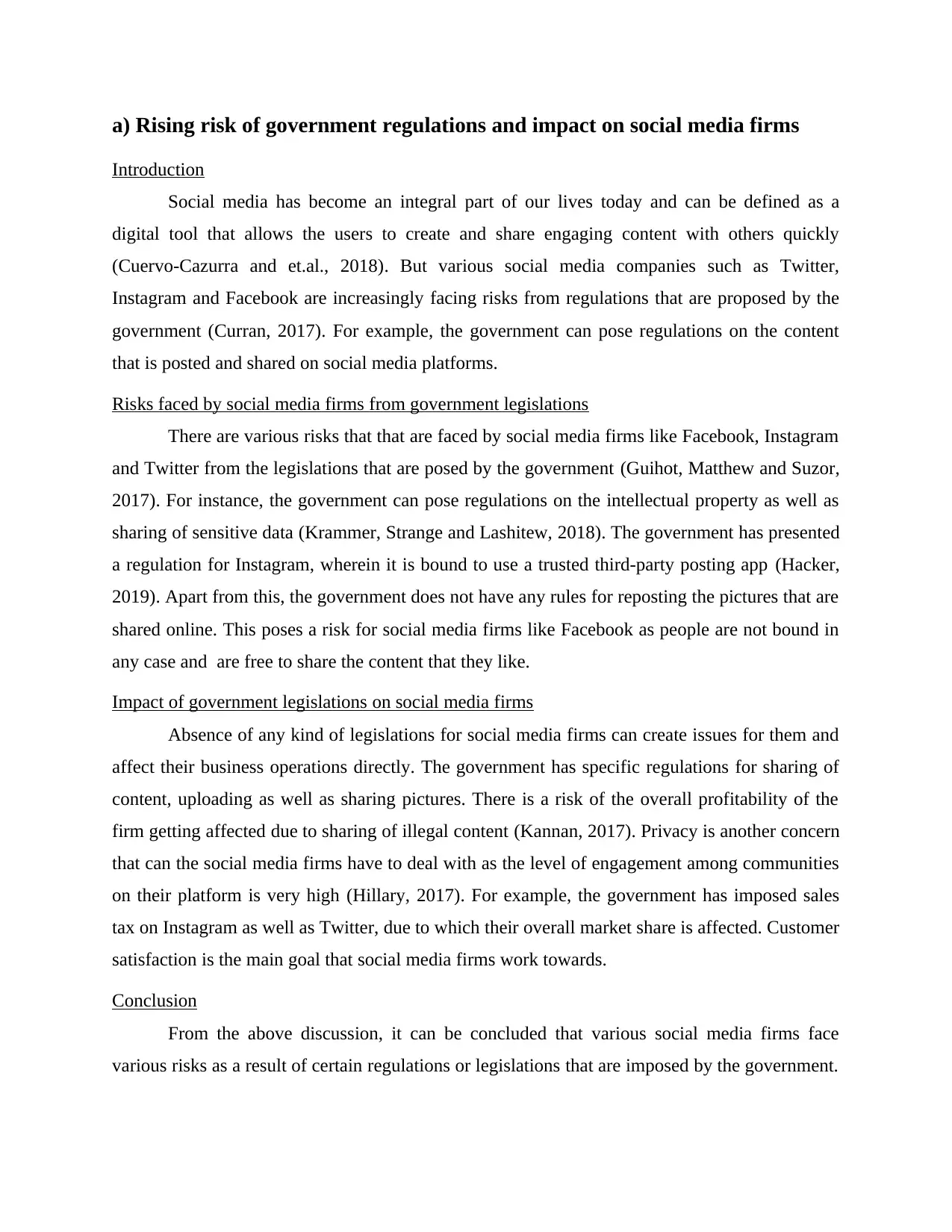
a) Rising risk of government regulations and impact on social media firms
Introduction
Social media has become an integral part of our lives today and can be defined as a
digital tool that allows the users to create and share engaging content with others quickly
(Cuervo-Cazurra and et.al., 2018). But various social media companies such as Twitter,
Instagram and Facebook are increasingly facing risks from regulations that are proposed by the
government (Curran, 2017). For example, the government can pose regulations on the content
that is posted and shared on social media platforms.
Risks faced by social media firms from government legislations
There are various risks that that are faced by social media firms like Facebook, Instagram
and Twitter from the legislations that are posed by the government (Guihot, Matthew and Suzor,
2017). For instance, the government can pose regulations on the intellectual property as well as
sharing of sensitive data (Krammer, Strange and Lashitew, 2018). The government has presented
a regulation for Instagram, wherein it is bound to use a trusted third-party posting app (Hacker,
2019). Apart from this, the government does not have any rules for reposting the pictures that are
shared online. This poses a risk for social media firms like Facebook as people are not bound in
any case and are free to share the content that they like.
Impact of government legislations on social media firms
Absence of any kind of legislations for social media firms can create issues for them and
affect their business operations directly. The government has specific regulations for sharing of
content, uploading as well as sharing pictures. There is a risk of the overall profitability of the
firm getting affected due to sharing of illegal content (Kannan, 2017). Privacy is another concern
that can the social media firms have to deal with as the level of engagement among communities
on their platform is very high (Hillary, 2017). For example, the government has imposed sales
tax on Instagram as well as Twitter, due to which their overall market share is affected. Customer
satisfaction is the main goal that social media firms work towards.
Conclusion
From the above discussion, it can be concluded that various social media firms face
various risks as a result of certain regulations or legislations that are imposed by the government.
Introduction
Social media has become an integral part of our lives today and can be defined as a
digital tool that allows the users to create and share engaging content with others quickly
(Cuervo-Cazurra and et.al., 2018). But various social media companies such as Twitter,
Instagram and Facebook are increasingly facing risks from regulations that are proposed by the
government (Curran, 2017). For example, the government can pose regulations on the content
that is posted and shared on social media platforms.
Risks faced by social media firms from government legislations
There are various risks that that are faced by social media firms like Facebook, Instagram
and Twitter from the legislations that are posed by the government (Guihot, Matthew and Suzor,
2017). For instance, the government can pose regulations on the intellectual property as well as
sharing of sensitive data (Krammer, Strange and Lashitew, 2018). The government has presented
a regulation for Instagram, wherein it is bound to use a trusted third-party posting app (Hacker,
2019). Apart from this, the government does not have any rules for reposting the pictures that are
shared online. This poses a risk for social media firms like Facebook as people are not bound in
any case and are free to share the content that they like.
Impact of government legislations on social media firms
Absence of any kind of legislations for social media firms can create issues for them and
affect their business operations directly. The government has specific regulations for sharing of
content, uploading as well as sharing pictures. There is a risk of the overall profitability of the
firm getting affected due to sharing of illegal content (Kannan, 2017). Privacy is another concern
that can the social media firms have to deal with as the level of engagement among communities
on their platform is very high (Hillary, 2017). For example, the government has imposed sales
tax on Instagram as well as Twitter, due to which their overall market share is affected. Customer
satisfaction is the main goal that social media firms work towards.
Conclusion
From the above discussion, it can be concluded that various social media firms face
various risks as a result of certain regulations or legislations that are imposed by the government.
⊘ This is a preview!⊘
Do you want full access?
Subscribe today to unlock all pages.

Trusted by 1+ million students worldwide

This can include risks relating to profitability, market share, customer satisfaction, various legal
risks etc.
risks etc.
Paraphrase This Document
Need a fresh take? Get an instant paraphrase of this document with our AI Paraphraser
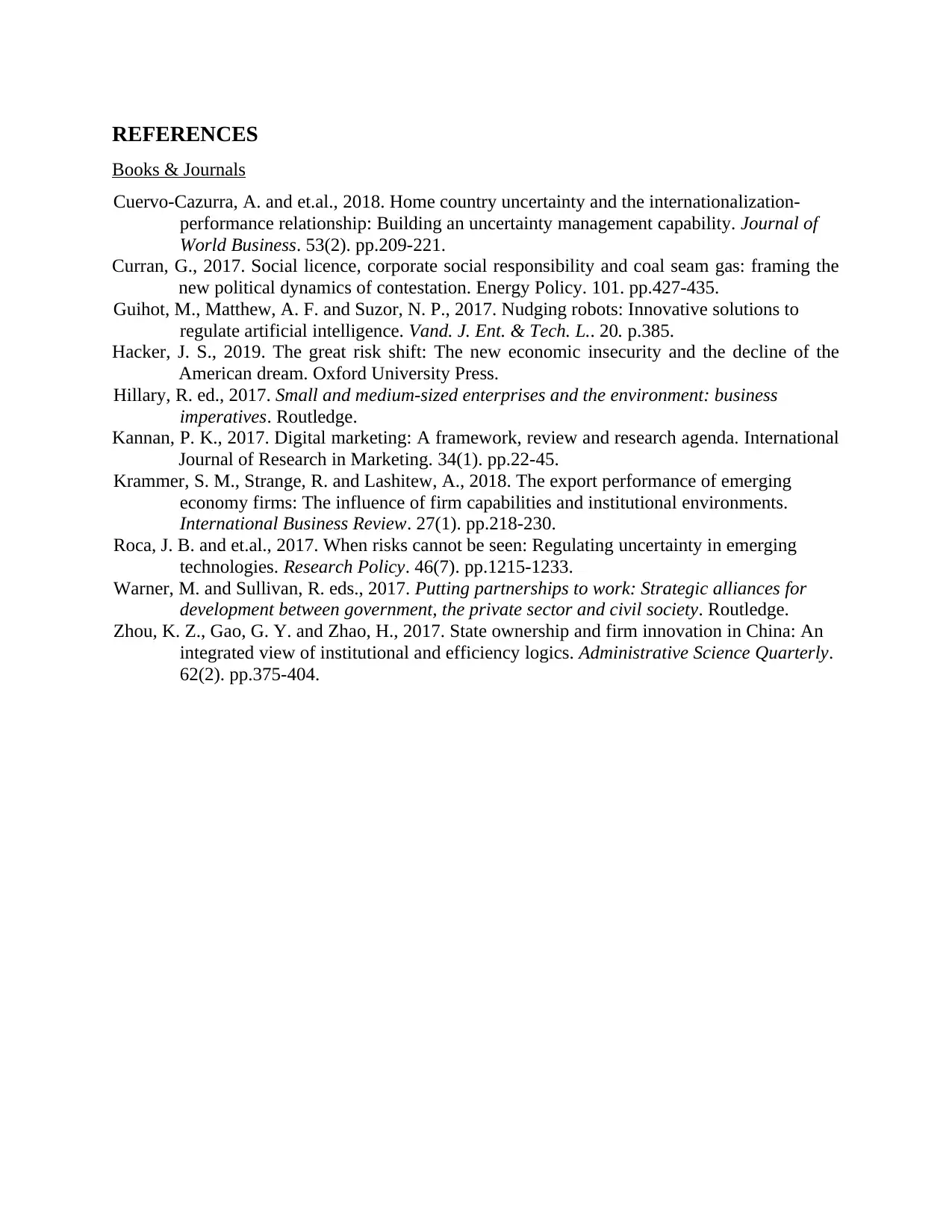
REFERENCES
Books & Journals
Cuervo-Cazurra, A. and et.al., 2018. Home country uncertainty and the internationalization-
performance relationship: Building an uncertainty management capability. Journal of
World Business. 53(2). pp.209-221.
Curran, G., 2017. Social licence, corporate social responsibility and coal seam gas: framing the
new political dynamics of contestation. Energy Policy. 101. pp.427-435.
Guihot, M., Matthew, A. F. and Suzor, N. P., 2017. Nudging robots: Innovative solutions to
regulate artificial intelligence. Vand. J. Ent. & Tech. L.. 20. p.385.
Hacker, J. S., 2019. The great risk shift: The new economic insecurity and the decline of the
American dream. Oxford University Press.
Hillary, R. ed., 2017. Small and medium-sized enterprises and the environment: business
imperatives. Routledge.
Kannan, P. K., 2017. Digital marketing: A framework, review and research agenda. International
Journal of Research in Marketing. 34(1). pp.22-45.
Krammer, S. M., Strange, R. and Lashitew, A., 2018. The export performance of emerging
economy firms: The influence of firm capabilities and institutional environments.
International Business Review. 27(1). pp.218-230.
Roca, J. B. and et.al., 2017. When risks cannot be seen: Regulating uncertainty in emerging
technologies. Research Policy. 46(7). pp.1215-1233.
Warner, M. and Sullivan, R. eds., 2017. Putting partnerships to work: Strategic alliances for
development between government, the private sector and civil society. Routledge.
Zhou, K. Z., Gao, G. Y. and Zhao, H., 2017. State ownership and firm innovation in China: An
integrated view of institutional and efficiency logics. Administrative Science Quarterly.
62(2). pp.375-404.
Books & Journals
Cuervo-Cazurra, A. and et.al., 2018. Home country uncertainty and the internationalization-
performance relationship: Building an uncertainty management capability. Journal of
World Business. 53(2). pp.209-221.
Curran, G., 2017. Social licence, corporate social responsibility and coal seam gas: framing the
new political dynamics of contestation. Energy Policy. 101. pp.427-435.
Guihot, M., Matthew, A. F. and Suzor, N. P., 2017. Nudging robots: Innovative solutions to
regulate artificial intelligence. Vand. J. Ent. & Tech. L.. 20. p.385.
Hacker, J. S., 2019. The great risk shift: The new economic insecurity and the decline of the
American dream. Oxford University Press.
Hillary, R. ed., 2017. Small and medium-sized enterprises and the environment: business
imperatives. Routledge.
Kannan, P. K., 2017. Digital marketing: A framework, review and research agenda. International
Journal of Research in Marketing. 34(1). pp.22-45.
Krammer, S. M., Strange, R. and Lashitew, A., 2018. The export performance of emerging
economy firms: The influence of firm capabilities and institutional environments.
International Business Review. 27(1). pp.218-230.
Roca, J. B. and et.al., 2017. When risks cannot be seen: Regulating uncertainty in emerging
technologies. Research Policy. 46(7). pp.1215-1233.
Warner, M. and Sullivan, R. eds., 2017. Putting partnerships to work: Strategic alliances for
development between government, the private sector and civil society. Routledge.
Zhou, K. Z., Gao, G. Y. and Zhao, H., 2017. State ownership and firm innovation in China: An
integrated view of institutional and efficiency logics. Administrative Science Quarterly.
62(2). pp.375-404.
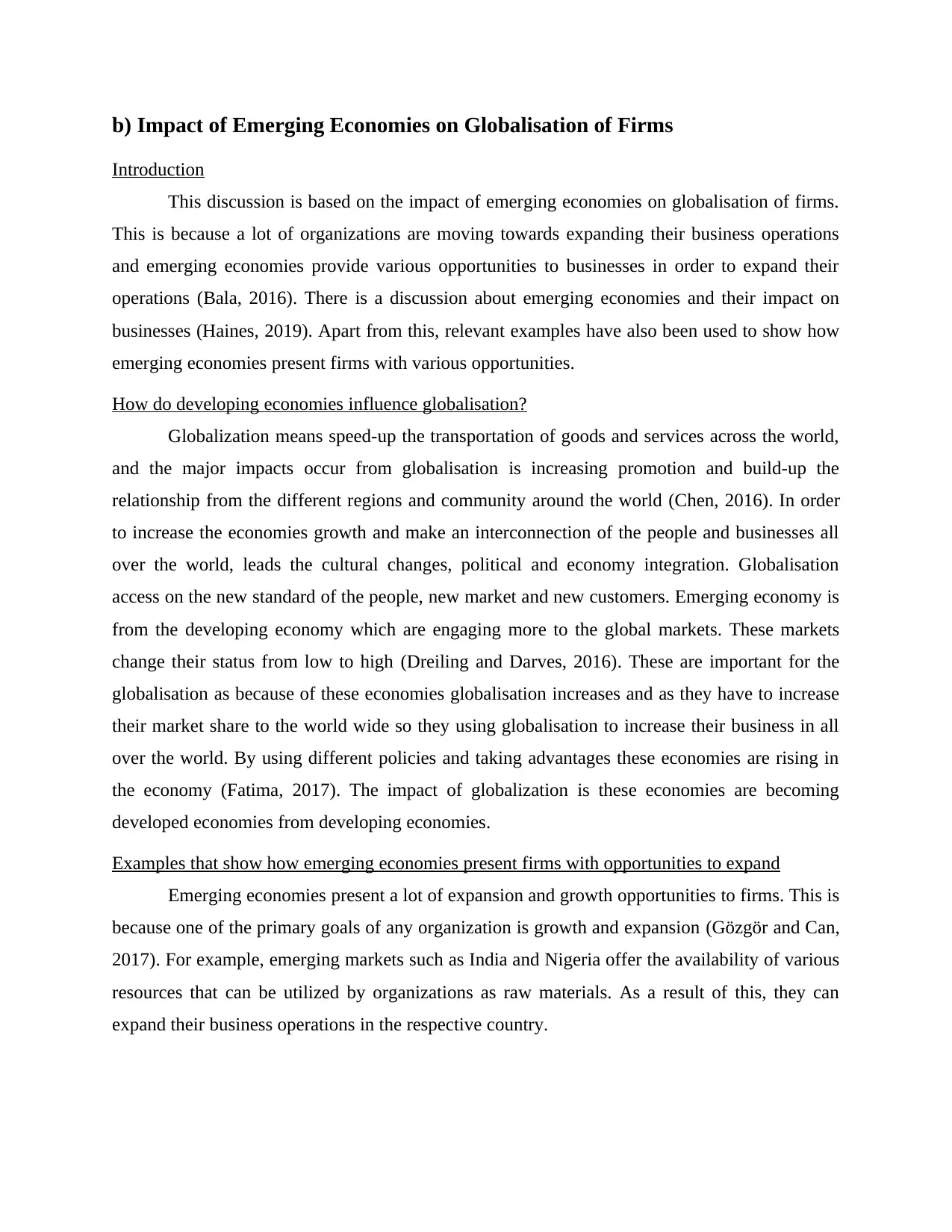
b) Impact of Emerging Economies on Globalisation of Firms
Introduction
This discussion is based on the impact of emerging economies on globalisation of firms.
This is because a lot of organizations are moving towards expanding their business operations
and emerging economies provide various opportunities to businesses in order to expand their
operations (Bala, 2016). There is a discussion about emerging economies and their impact on
businesses (Haines, 2019). Apart from this, relevant examples have also been used to show how
emerging economies present firms with various opportunities.
How do developing economies influence globalisation?
Globalization means speed-up the transportation of goods and services across the world,
and the major impacts occur from globalisation is increasing promotion and build-up the
relationship from the different regions and community around the world (Chen, 2016). In order
to increase the economies growth and make an interconnection of the people and businesses all
over the world, leads the cultural changes, political and economy integration. Globalisation
access on the new standard of the people, new market and new customers. Emerging economy is
from the developing economy which are engaging more to the global markets. These markets
change their status from low to high (Dreiling and Darves, 2016). These are important for the
globalisation as because of these economies globalisation increases and as they have to increase
their market share to the world wide so they using globalisation to increase their business in all
over the world. By using different policies and taking advantages these economies are rising in
the economy (Fatima, 2017). The impact of globalization is these economies are becoming
developed economies from developing economies.
Examples that show how emerging economies present firms with opportunities to expand
Emerging economies present a lot of expansion and growth opportunities to firms. This is
because one of the primary goals of any organization is growth and expansion (Gözgör and Can,
2017). For example, emerging markets such as India and Nigeria offer the availability of various
resources that can be utilized by organizations as raw materials. As a result of this, they can
expand their business operations in the respective country.
Introduction
This discussion is based on the impact of emerging economies on globalisation of firms.
This is because a lot of organizations are moving towards expanding their business operations
and emerging economies provide various opportunities to businesses in order to expand their
operations (Bala, 2016). There is a discussion about emerging economies and their impact on
businesses (Haines, 2019). Apart from this, relevant examples have also been used to show how
emerging economies present firms with various opportunities.
How do developing economies influence globalisation?
Globalization means speed-up the transportation of goods and services across the world,
and the major impacts occur from globalisation is increasing promotion and build-up the
relationship from the different regions and community around the world (Chen, 2016). In order
to increase the economies growth and make an interconnection of the people and businesses all
over the world, leads the cultural changes, political and economy integration. Globalisation
access on the new standard of the people, new market and new customers. Emerging economy is
from the developing economy which are engaging more to the global markets. These markets
change their status from low to high (Dreiling and Darves, 2016). These are important for the
globalisation as because of these economies globalisation increases and as they have to increase
their market share to the world wide so they using globalisation to increase their business in all
over the world. By using different policies and taking advantages these economies are rising in
the economy (Fatima, 2017). The impact of globalization is these economies are becoming
developed economies from developing economies.
Examples that show how emerging economies present firms with opportunities to expand
Emerging economies present a lot of expansion and growth opportunities to firms. This is
because one of the primary goals of any organization is growth and expansion (Gözgör and Can,
2017). For example, emerging markets such as India and Nigeria offer the availability of various
resources that can be utilized by organizations as raw materials. As a result of this, they can
expand their business operations in the respective country.
⊘ This is a preview!⊘
Do you want full access?
Subscribe today to unlock all pages.

Trusted by 1+ million students worldwide
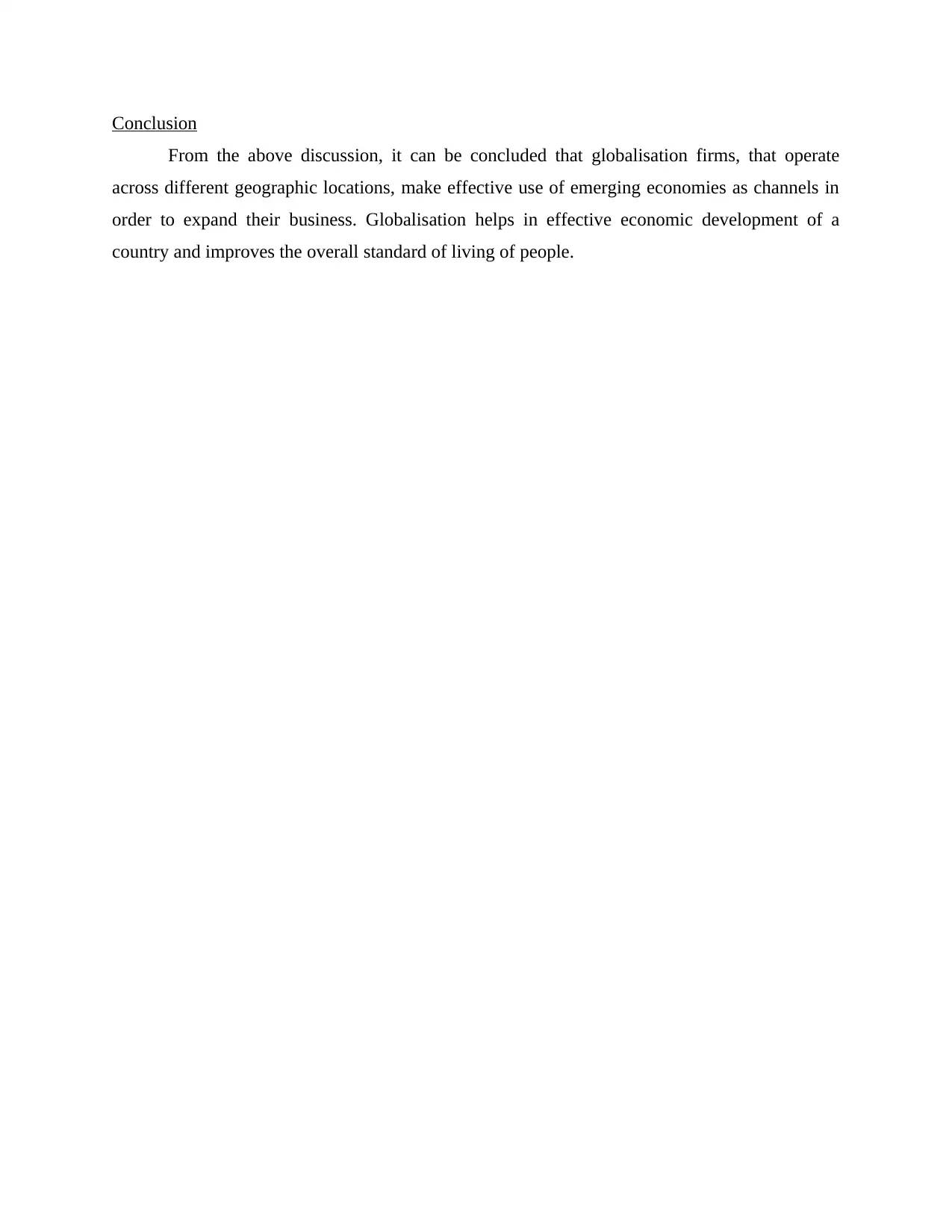
Conclusion
From the above discussion, it can be concluded that globalisation firms, that operate
across different geographic locations, make effective use of emerging economies as channels in
order to expand their business. Globalisation helps in effective economic development of a
country and improves the overall standard of living of people.
From the above discussion, it can be concluded that globalisation firms, that operate
across different geographic locations, make effective use of emerging economies as channels in
order to expand their business. Globalisation helps in effective economic development of a
country and improves the overall standard of living of people.
Paraphrase This Document
Need a fresh take? Get an instant paraphrase of this document with our AI Paraphraser
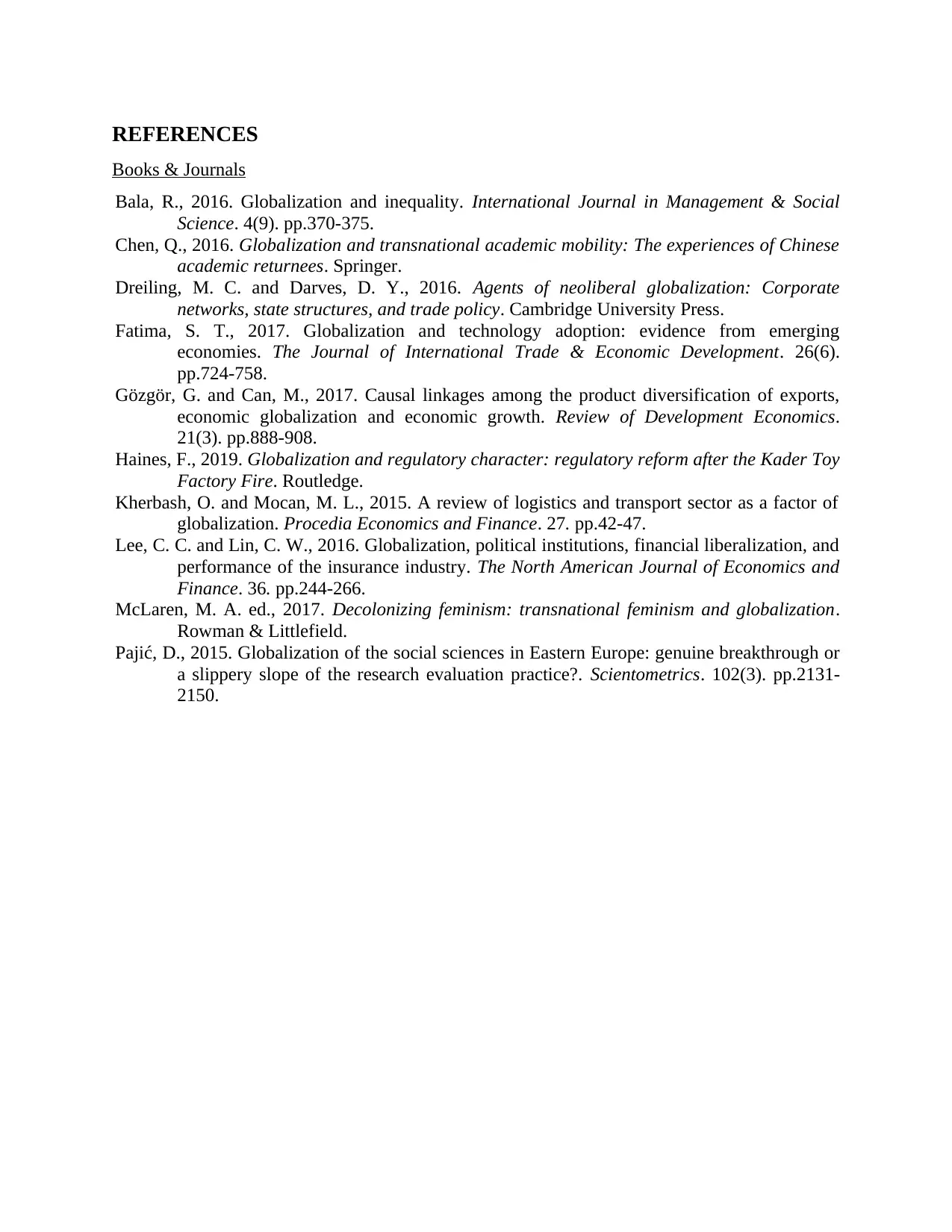
REFERENCES
Books & Journals
Bala, R., 2016. Globalization and inequality. International Journal in Management & Social
Science. 4(9). pp.370-375.
Chen, Q., 2016. Globalization and transnational academic mobility: The experiences of Chinese
academic returnees. Springer.
Dreiling, M. C. and Darves, D. Y., 2016. Agents of neoliberal globalization: Corporate
networks, state structures, and trade policy. Cambridge University Press.
Fatima, S. T., 2017. Globalization and technology adoption: evidence from emerging
economies. The Journal of International Trade & Economic Development. 26(6).
pp.724-758.
Gözgör, G. and Can, M., 2017. Causal linkages among the product diversification of exports,
economic globalization and economic growth. Review of Development Economics.
21(3). pp.888-908.
Haines, F., 2019. Globalization and regulatory character: regulatory reform after the Kader Toy
Factory Fire. Routledge.
Kherbash, O. and Mocan, M. L., 2015. A review of logistics and transport sector as a factor of
globalization. Procedia Economics and Finance. 27. pp.42-47.
Lee, C. C. and Lin, C. W., 2016. Globalization, political institutions, financial liberalization, and
performance of the insurance industry. The North American Journal of Economics and
Finance. 36. pp.244-266.
McLaren, M. A. ed., 2017. Decolonizing feminism: transnational feminism and globalization.
Rowman & Littlefield.
Pajić, D., 2015. Globalization of the social sciences in Eastern Europe: genuine breakthrough or
a slippery slope of the research evaluation practice?. Scientometrics. 102(3). pp.2131-
2150.
Books & Journals
Bala, R., 2016. Globalization and inequality. International Journal in Management & Social
Science. 4(9). pp.370-375.
Chen, Q., 2016. Globalization and transnational academic mobility: The experiences of Chinese
academic returnees. Springer.
Dreiling, M. C. and Darves, D. Y., 2016. Agents of neoliberal globalization: Corporate
networks, state structures, and trade policy. Cambridge University Press.
Fatima, S. T., 2017. Globalization and technology adoption: evidence from emerging
economies. The Journal of International Trade & Economic Development. 26(6).
pp.724-758.
Gözgör, G. and Can, M., 2017. Causal linkages among the product diversification of exports,
economic globalization and economic growth. Review of Development Economics.
21(3). pp.888-908.
Haines, F., 2019. Globalization and regulatory character: regulatory reform after the Kader Toy
Factory Fire. Routledge.
Kherbash, O. and Mocan, M. L., 2015. A review of logistics and transport sector as a factor of
globalization. Procedia Economics and Finance. 27. pp.42-47.
Lee, C. C. and Lin, C. W., 2016. Globalization, political institutions, financial liberalization, and
performance of the insurance industry. The North American Journal of Economics and
Finance. 36. pp.244-266.
McLaren, M. A. ed., 2017. Decolonizing feminism: transnational feminism and globalization.
Rowman & Littlefield.
Pajić, D., 2015. Globalization of the social sciences in Eastern Europe: genuine breakthrough or
a slippery slope of the research evaluation practice?. Scientometrics. 102(3). pp.2131-
2150.
1 out of 8
Related Documents
Your All-in-One AI-Powered Toolkit for Academic Success.
+13062052269
info@desklib.com
Available 24*7 on WhatsApp / Email
![[object Object]](/_next/static/media/star-bottom.7253800d.svg)
Unlock your academic potential
Copyright © 2020–2026 A2Z Services. All Rights Reserved. Developed and managed by ZUCOL.





